Cuirass 1.0 released
We are pleased to announce the release of Cuirass version 1.0, after almost five years of development and around 700 commits from 14 contributors.
Cuirass is the GNU Guix continuous integration software. It's a general purpose build automation server written in GNU Guile that checks out sources from VCS repositories, execute build jobs and store build results in a database. Cuirass also provides a web interface to monitor the build results.
Cuirass is running on the GNU Guix build farm.
Since January, the project is funded through the NGI0 PET Fund, a fund established by NLnet with financial support from the European Commission's Next Generation, as explained here.
Thanks to this support, we were able to speed up the developments and finally propose a first release of this software. Many things have changed in Cuirass over the years and now is the perfect time to give it a try.
Here are the highlights of this new release.
Database
Let's start with the database that is the core of Cuirass. Until recently Cuirass was using an SQLite3 database. This technological choice proved to be quite challenging, and we had some troubles to make it scale as discussed here.
Cuirass now uses a PostgreSQL database, bringing the performance issues to an end while providing much more stability. Almost all the SQL queries are covered by test cases.
Specifications
In order to build some derivations, Cuirass first needs to be told what to build. Originally, an obscure association list describing the requested build jobs had to be passed to Cuirass.
Cuirass now operates on specification records that are described here. This input format is much more easy to understand for the user. It relies on Guix channels, which are well-adopted.
Here are a few different specifications examples.
This will build all the packages of the my-channel channel.
(list (specification
(name "my-channel")
(build '(channels my-channel))
(channels
(cons (channel
(name 'my-channel)
(url "https://my-channel.git"))
%default-channels))))This will build the linux-libre package on the default Guix channel master
branch.
(list (specification
(name "my-linux")
(build '(packages "linux-libre"))))Finally, this will build the packages declared in the my-manifest file of
the my-channel channel, against the core-updates branch of the default
Guix channel.
(list (specification
(name "my-core-manifest")
(build '(manifests "my-manifest"))
(channels
(list (channel
(name 'my-channel)
(url "https://my-channel.git"))
(channel
(name 'guix)
(url %default-channel-url)
(branch "core-updates"))))))For people willing to spare some parens, a specification edition form has been implemented in the Web interface.
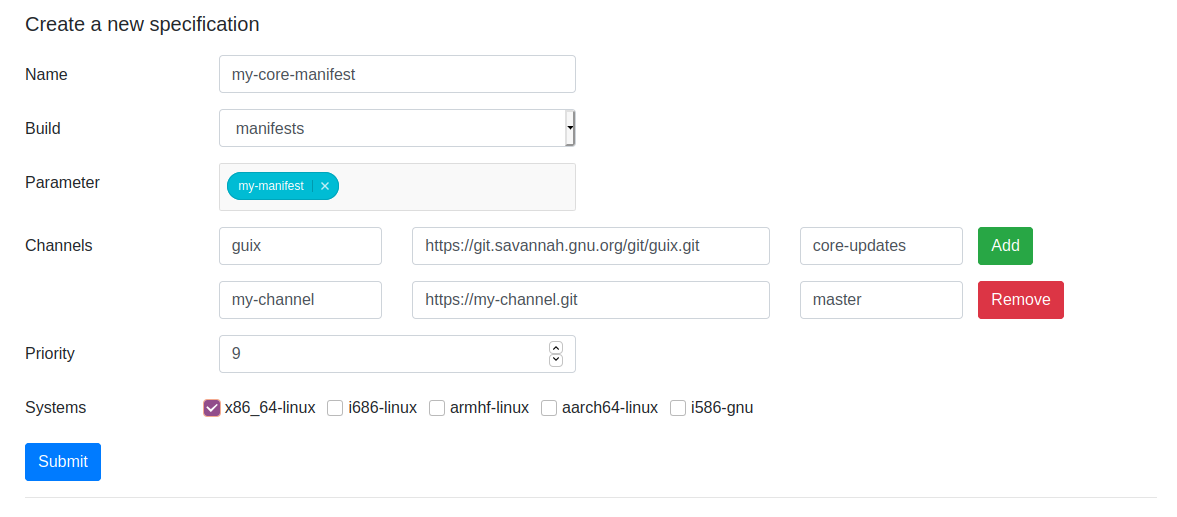
The Cuirass home page has also been updated to reflect this new input format.
Notifications
This feature was rightfully requested many times as this is a basic of any respectable CI system. Cuirass can now report failing and fixed builds in three different ways:
By email on the guix-ci@gnu.org mailing list.
Using Mastodon thanks to the Guile-Mastodon bindings.
Using the RSS feed available here.
New build mode
The traditional way of building things in Cuirass is to send batches of derivations that need to be built to the local Guix daemon. The daemon can possibly offload those builds to other machines. While it's probably the most sensible way to proceed, this solution doesn't scale well and suffers from some limitations.
There's no way to influence the scheduling decisions of the Guix daemon. It's quite delicate to prioritize builds or build machines from Cuirass.
The Guix daemon doesn't offer much feedback. Cuirass needs to parse the debug output of the daemon to detect build events such as start and stop events.
Using a unique daemon means using unique build parameters such as build
timeoutandmax-silent-timeproperties. Some packages have different build properties and Cuirass cannot honor them.When relying heavily on offloading, the Guix daemon scales badly. Builds that often take a longer time to complete, such as emulated builds can saturate the build queue.
For all those reasons, using a new build mode seemed like a necessary evil. The rationale behind this new build mode is to have Cuirass communicate directly with the Guix daemons of all the offloading machines. Instead of dealing with a single, local, Guix daemon, Cuirass can now interact with several Guix daemons on remote machines.
The build jobs are not submitted to the local Guix daemon. Instead, a remote server dispatches build requests to the connect remote workers, according to the build priorities.
The remote server and the connected workers communicate using ZeroMQ over TCP. The workers are able to discover the remote server using Avahi.
The built items are exchanged as substitutes by spawning Guix publish servers both on the remote server and on each connected remote worker.
It seems more complex, and it is indeed more complex. However, the performance gains are real.

This chart shows the CPU idle time percentage of the GNU Guix build farm machines. The introduction of the remote building mechanism around January 2021 results in a much higher activity of the connected machines.
This remote build mode also unlocked new features such as:
The live streaming of build logs from remote workers to Cuirass so that they can be browsed in real time through the web interface.
The support for
timeoutandmax-silent-timepackage properties.The support for specification and package priorities.
The new "Workers status" and "Machine status" pages allowing to closely monitor remote machine activities.
The workers status page is accessible here.
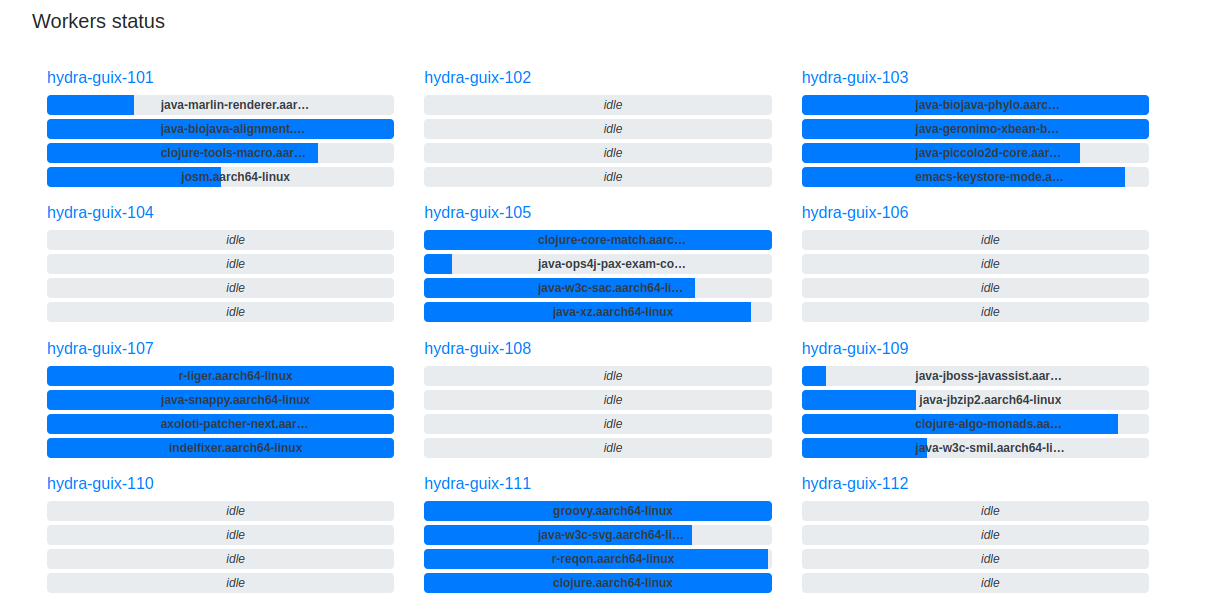
The machine status page is accessible here.
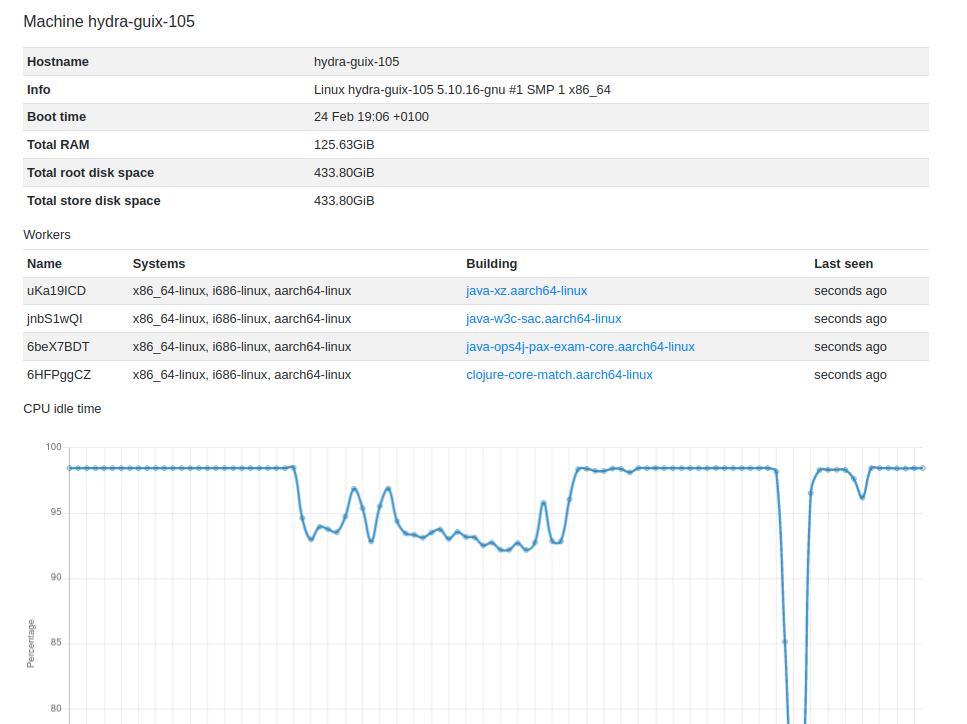
Web interface
Besides the features related to the specification record introduction, several improvements were brought to the Web interface.
Some administration actions that previously required manual SQL intervention can now be performed directly through the Web interface.
Any Cuirass administrator can now:
- Add a specification
- Edit a specification
- Delete a specification
- Cancel an evaluation pending builds
- Retry all builds of an evaluation
- Retry an evaluation
- Restart a build
The build page was also improved to display the build weather and a build history.
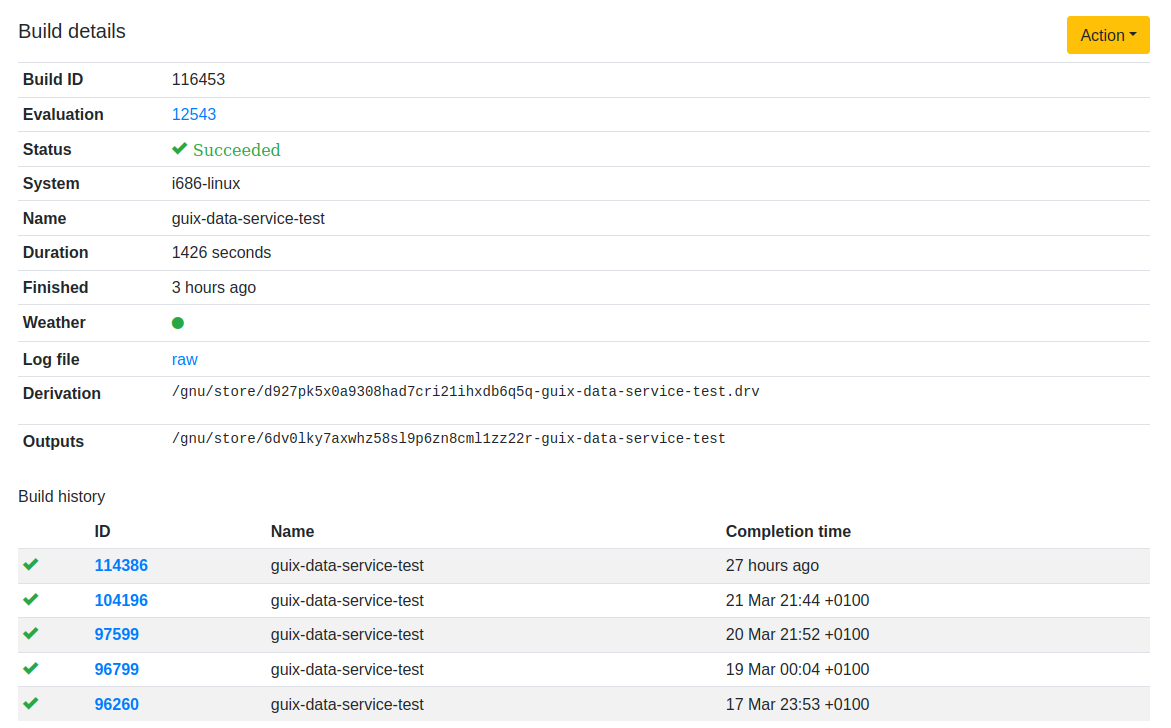
Several issues were also fixed such as the broken pagination and the negative build duration.
Metrics
Cuirass computes periodically various metrics such as:
- Average evaluation duration per specification (seconds).
- Difference between newly added derivations and built derivations per day.
- Average time required for an evaluation to start its builds.
- Evaluation completion speed.
- Sum of currently pending builds.
- Builds count per machine during the last day.
- Percentage of failed evaluations.
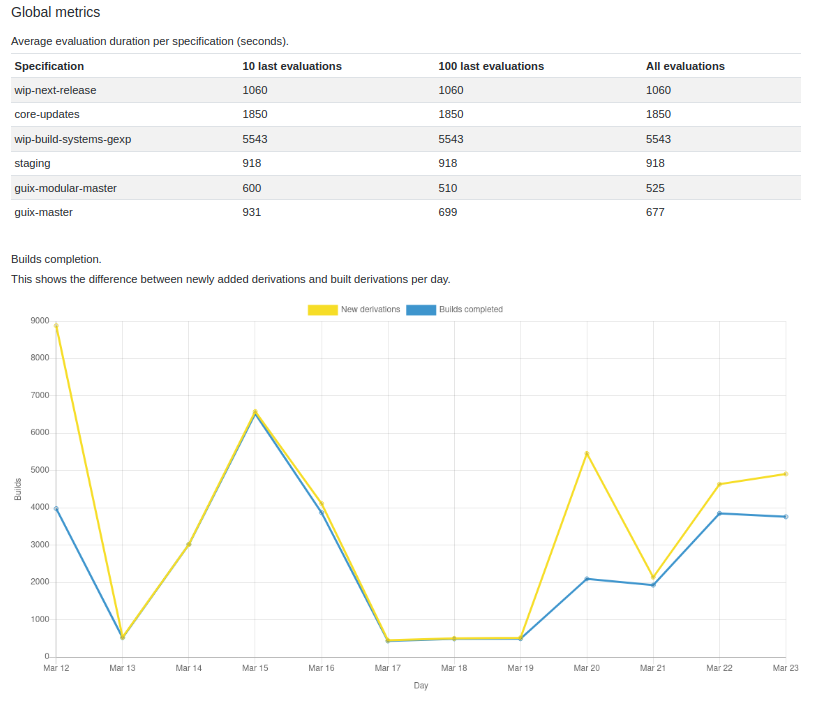
Those metrics can be browsed here.
Documentation
The Cuirass documentation is now updated to reflect those changes and can be browsed online.
The release itself is available on Cuirass home page.
The Guix's Cuirass package as well as the Cuirass service were also updated.
Going further
The NLNet grant will allow me to keep working on Cuirass for a couple more months. This will hopefully help us to:
Connect more armhf/aarch64 machines to the build farm.
Fix the build dependencies issue
Add a substitutes availability API and its counterpart in GNU Guix to improve the the
channel-with-substitute-availableprocedure to take a manifest argument. This way, theguix pullcommand can be instructed to only update to Guix revisions where the manifest packages are all substitutable.
This release is an important milestone as, combined with the recent substitute improvements, the whole substitute availability & download speed situation is now largely mitigated, at least on Intel architectures.
Don't hesitate to run your own Cuirass server to build stuff ahead of the GNU Guix build farm, or to build your custom channels. Also feel free to share the features you would like to see in the next Cuirass release.
Unless otherwise stated, blog posts on this site are copyrighted by their respective authors and published under the terms of the CC-BY-SA 4.0 license and those of the GNU Free Documentation License (version 1.3 or later, with no Invariant Sections, no Front-Cover Texts, and no Back-Cover Texts).